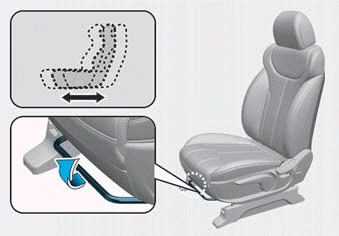Hyundai Palisade: Rear Suspension System / Rear Lower Arm
Hyundai Palisade (LX2) 2020-2025 Service Manual / Suspension System / Rear Suspension System / Rear Lower Arm
Repair procedures
| Removal |
| 1. |
Loosen the wheel nuts slightly.
Raise the vehicle, and make sure it is securely supported.
|
| 2. |
Remove the rear wheel and tire (A) from rear hub.
|
| 3. |
Loosen the bolt & nut and then remove the rear lower arm (A) from the
rear axle.
|
| 4. |
Loosen the bolt & nut (A) and then disconnect the rear shock absorber
from the lower arm.
|
| 5. |
Loosen the nut (A) and then disconnect the stabilizer bar link from
the lower arm.
|
| 6. |
Remove the coil spring (A).
|
| 7. |
Loosen the bolt & nut and then remove the rear lower arm (A).
|
| Inspection |
| 1. |
Check the bushing for wear and deterioration.
|
| 2. |
Check the rear lower arm for deformation.
|
| 3. |
Check the coil spring and spring pad for deterioration and deformation.
|
| 4. |
Check for all bolts and nut.
|
| Installation |
| 1. |
Install in the reverse order of removal.
|
| 2. |
Check the alignment.
(Refer to Suspension System - "Alingment")
|
 Rear Upper Arm
Rear Upper Arm
Repair procedures
Removal
1.
Loosen the wheel nuts slightly.
Raise the vehicle, and make sure it is securely supported...
 Rear Coil Spring
Rear Coil Spring
Repair procedures
Removal
1.
Loosen the wheel nuts slightly.
Raise the vehicle, and make sure it is securely supported...
Other information:
Hyundai Palisade (LX2) 2020-2025 Service Manual: Purge Control Solenoid Valve (PCSV)
Specifications Specification Item Specification Coil Resistance (Ω) 18.5 - 22.5 [20°C (68°F)] Description and operation Description Purge Control Solenoid Valve (PCSV) is installed on the surge tank and controls the passage between the canister and the intake manifold...
Hyundai Palisade (LX2) 2020-2025 Service Manual: Release residual pressure in fuel line
Release Residual Pressure in Fuel Line • Whenever the high pressure fuel fuse, fuel pipe, delivery pipe, or injector is removed immediately after shutting off the engine, an injury may be caused by the release of highly pressurized fuel...
Categories
- Manuals Home
- 1st Generation Palisade Owners Manual
- 1st Generation Palisade Service Manual
- Child-Protector Rear Door Locks
- Reverse Parking Aid Function
- AWD Operation
- New on site
- Most important about car
Manual adjustment
The front seat can be adjusted by using the levers located on the outside of the seat cushion. Before driving, adjust the seat to the proper position so that you can easily control the steering wheel, foot pedals and controls on the instrument panel.

Copyright © 2025 www.hpalisadelx.com








